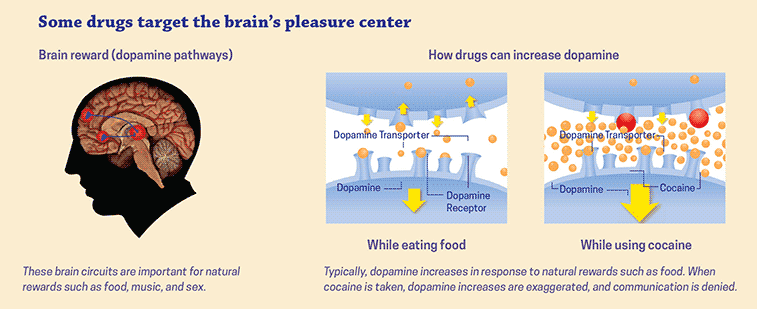Are you curious about how stimulants can affect your brain and overall cognitive performance? From coffee to energy drinks, and even prescription medications, stimulants are everywhere in our lives. In this article, we’ll explore how different types of stimulants can affect the brain, both short and long-term. We’ll also look at potential risks associated with taking stimulants, as well as their potential benefits. By the end, you’ll have a better understanding of how stimulants can influence brain function. So, let’s get started.

Contents
What Are Stimulants?
Stimulants are drugs that increase the activity of the central nervous system (CNS). They are commonly used to treat conditions such as attention deficit hyperactivity disorder (ADHD), narcolepsy, and sleep deprivation. Stimulants work by affecting the neurotransmitters in the brain that are responsible for controlling behavior and mood. Common stimulants include caffeine, cocaine, amphetamines, and nicotine.
How Do Stimulants Work?
Stimulants act on the brain by increasing the levels of certain neurotransmitters, such as dopamine and norepinephrine. These neurotransmitters are responsible for controlling behavior and mood. When stimulants are taken, they cause these neurotransmitters to be released in higher amounts. This can lead to an increase in alertness, focus, and energy.
What Effects Do Stimulants Have on the Brain?
The effects of stimulants on the brain depend on the type of stimulant taken, the dose, and the individual. Common effects of stimulants on the brain include increased alertness, focus, and energy. Stimulants can also increase heart rate and blood pressure, and can lead to feelings of euphoria. In some cases, stimulants can also lead to increased risk-taking behavior and aggression.
Short-Term Effects of Stimulants on the Brain
When taken in high doses, stimulants can cause a number of short-term effects on the brain. These can include increased alertness, focus, and energy. Stimulants can also cause an increase in heart rate, blood pressure, and breathing rate. Other short-term effects of stimulants on the brain can include feelings of euphoria, increased risk-taking behavior, and aggression.
Long-Term Effects of Stimulants on the Brain
When taken in large doses or for long periods of time, stimulants can cause long-term effects on the brain. These effects can include changes in brain chemistry, an increased risk of addiction, and an increased risk of mental health problems such as anxiety and depression.
Risks of Taking Stimulants
Stimulants can be dangerous if not taken as prescribed. They can cause serious side effects such as increased heart rate and blood pressure, increased risk-taking behavior, and increased risk of addiction. Stimulants can also cause long-term changes in brain chemistry and an increased risk of mental health problems such as anxiety and depression. It is important to talk to a doctor before taking any stimulants.
Conclusion
Stimulants are drugs that increase the activity of the central nervous system. They can be used to treat conditions such as ADHD and narcolepsy, and can cause a number of short-term and long-term effects on the brain. Common effects of stimulants on the brain include increased alertness, focus, and energy. Stimulants can also cause an increased risk of addiction and mental health problems such as anxiety and depression. It is important to talk to a doctor before taking any stimulants.
Top 6 Frequently Asked Questions
What is a Stimulant?
A stimulant is a type of medication or drug that is designed to stimulate the central nervous system in order to increase energy, alertness and focus. Stimulants are used to treat various conditions such as attention deficit hyperactivity disorder (ADHD), narcolepsy, and depression. Some of the most common stimulants are amphetamines, methylphenidate, and caffeine.
How Does a Stimulant Affect Brain Function?
Stimulants affect the brain by increasing levels of the neurotransmitters dopamine and norepinephrine. These neurotransmitters are responsible for controlling alertness, motivation, focus, and concentration. By increasing the levels of these neurotransmitters, stimulants can help improve concentration and focus, as well as reduce fatigue. In addition, they can help to improve the mood by increasing the levels of dopamine and norepinephrine, which can help to reduce symptoms of depression.
What are the Possible Side Effects of Stimulants?
Stimulants can have a variety of side effects, including increased heart rate, increased blood pressure, insomnia, irritability, decreased appetite, and headaches. Other potential side effects include anxiety, restlessness, and agitation. It is important to speak to a healthcare professional about the potential side effects of any stimulant before taking it.
What is the Recommended Dosage of Stimulants?
The recommended dosage of stimulants will vary depending on the type of medication or drug being taken, as well as the individual’s medical history. It is important to follow the instructions of a healthcare professional when taking stimulants, as taking too much or too little can have serious side effects.
Are Stimulants Addictive?
Yes, some stimulants can be addictive when taken in large doses or for long periods of time. Stimulants can be habit forming, and it is important to follow the instructions of a healthcare professional when taking them. If you are concerned that you may be addicted to a stimulant, it is important to speak with a healthcare professional.
Can Stimulants be Used with Other Medications?
Yes, stimulants can be used in combination with other medications, however it is important to speak to a healthcare professional before taking any new medications. Some medications or drugs can interact with stimulants, which can lead to serious side effects. It is important to make sure that all of your medications are compatible before taking them together.
2-Minute Neuroscience: Amphetamine
In conclusion, stimulants can have a powerful effect on the brain, causing increased alertness and energy levels, improved focus, and improved concentration. However, these effects can come with risks and side effects such as increased blood pressure, insomnia, and anxiety. Therefore, it is important to consult a medical professional before beginning any stimulant medication or supplement to ensure it is the right option for your particular needs.

